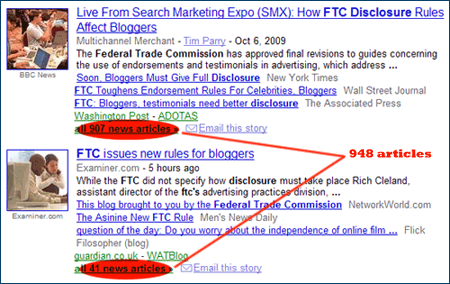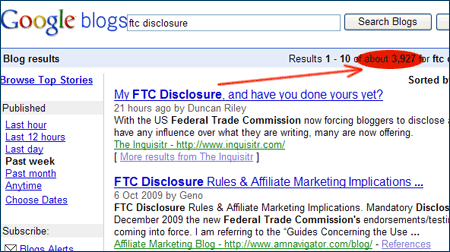A tremendous tsunami of blog posts and articles has been raised by the recent Federal Trade Commission’s announcement of its guides for disclosing the sponsor-endorser element in testimonials and endorsements. At the time of this post there currently are 948 news articles and close to 4,000 blog posts on the topic:


The wave was to a large extent fueled by references that FTC will impose a $11,000 fine per every occurrence of violation on the blogger’s/endorser’s site. Here are just a few examples: @Mashable, @Examiner, @Econsultancy.
It seems that such posts were not entirely groundless. On Monday, October 5, the Associated Press reported:
The FTC said Monday its commissioners voted 4-0 to approve the final Web guidelines, which had been expected. Violating the rules, which take effect Dec. 1, could bring fines up to $11,000 per violation. Bloggers or advertisers also could face injunctions and be ordered to reimburse consumers for financial losses stemming from inappropriate product reviews. [bold font mine]
Today Jennifer Vilaga of the Fast Company has put the minds of many affiliates at ease. Quoting the FTC’s assistant director of advertising practices Richard Cleland her article writes:
“That $11,000 fine is not true. Worst-case scenario, someone receives a warning, refuses to comply, followed by a serious product defect; we would institute a proceeding with a cease-and-desist order and mandate compliance with the law. To the extent that I have seen and heard, people are not objecting to the disclosure requirements but to the fear of penalty if they inadvertently make a mistake. That’s the thing I don’t think people need to be concerned about. There’s no monetary penalty, in terms of the first violation, even in the worst case. Our approach is going to be educational, particularly with bloggers. We’re focusing on the advertisers: What kind of education are you providing them, are you monitoring the bloggers and whether what they’re saying is true?”
So affiliates need not be afraid of immediate fines, but advertisers/merchants who run affiliate programs must take the steps to educate their affiliates on the subject, as well as to ensure that there are policing instruments in place — to monitor bloggers and other content publishers who promote them through affiliate links.
The above-quoted Fast Company’s article also has Cleland’s answers regarding the placement of disclosures within blogs (“whether you make it outside of the text but in proximity to blog, or incorporate it into the blog discussion itself — those are the issues that bloggers will have discretion about”), enforcement plans, and much more. It ends with:
Got a question you want us to ask the FTC? We’ll forward it to Richard Cleland directly. Send it to ideas@fastcompany.com.
I’ve just emailed my questions in.
I think two very important factors here are disclosure and education.
Coming from a real estate background disclosure has always been paramount in all my marketing endeavors.
If you have nothing to hide, then full disclosure of known material facts, including your affiliation or agency with an entity, should be nothing more than simply par for the course.
As long as we educate our affiliates to the necessity of this ( and other ) disclosures, this should really be seen as nothing more than a further honing down and polishing of a very lucrative industry.
Pingback: FTC: About that $11,000 Fine?
Ron, I fully agree. Affiliates that have nothing to hide have nothing to fear. Merchants, on the other hand, should do their job educating affiliates on the subject.
The part that gets me thinking is the policing part. Richard Cleland said that FTC is going to be “focusing on the advertisers” — on (i) the education they are providing their publishers with, and (ii) how they are “monitoring the bloggers”. It is the latter part that leaves some open questions. The burden of enforcing is passed on to the advertisers, and they are the ones who are going to be held accountable.